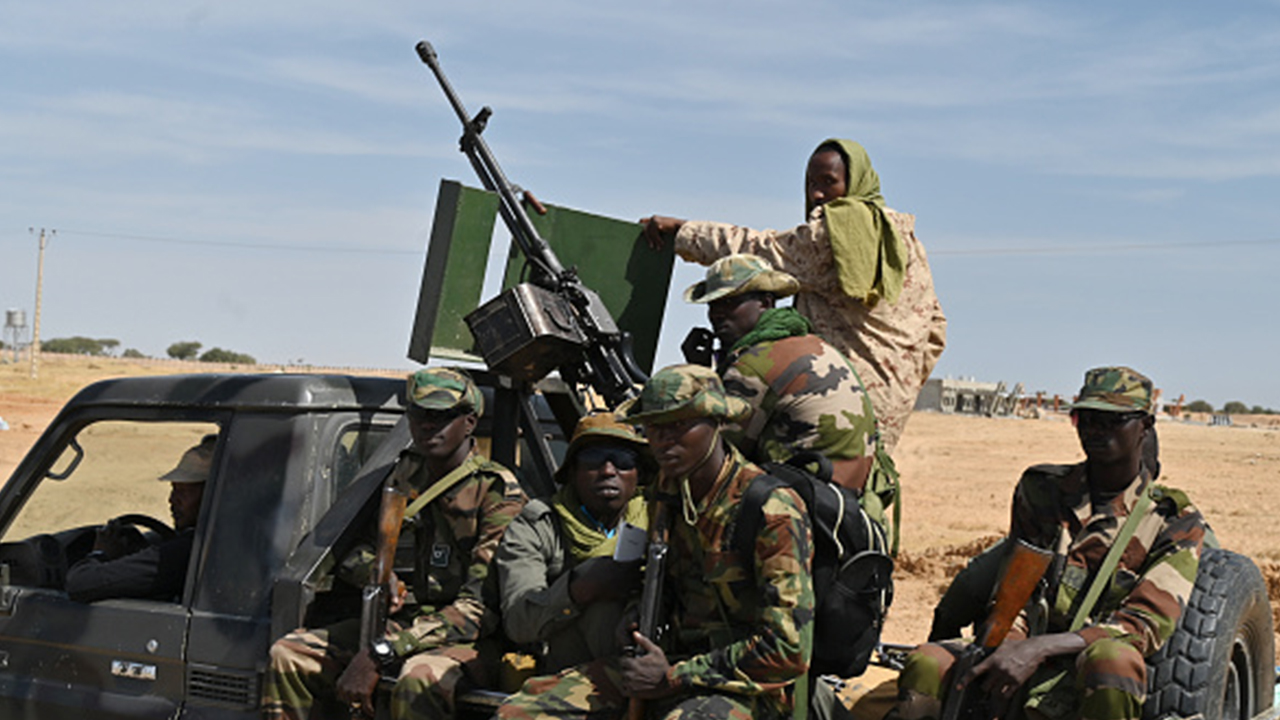By Kabir Adamu | Nigeria’s governing All Progressives Congress (APC) has been prioritising the task of improving national security since it won federal elections for the first time in 2015. However, after almost nine years of steering the affairs of Nigeria, the party is yet to fully tame the scourge of insecurity, which remains a critical challenge to the country and its citizens.
When President Bola Tinubu assumed office on 29th May 2023, insecurity was still widespread. Many Nigerians were living in fear, especially in rural areas regularly besieged by non-state armed groups. Insecurity was also taking a grave toll on economic activities, especially commerce and agriculture. Schools in many parts of the country were shut down following a spate of mass abductions of students, and sometimes of teachers. This was in addition to the humanitarian crisis occasioned by mass displacements in affected states.
The unending sit-at-home order enforced by the Eastern Security Network (ESN), believed to be the armed wing of the Indigenous Peoples of Biafra (IPOB), was negatively affecting trade in an area known for its vibrant commercial activities. The continued debasement of state legitimacy was emboldening criminals and had the potential of ultimately leading to the creation of states within a state. In the North-West and North-Central, the sacking of hundreds of farming communities was exacerbating food insecurity. The rapid spread of Ansaru fi Biladil Sudan (Ansaru), the Jamatus Ahlis Sunna (JAS) and Islamic State of West Africa Province (ISWAP) cells in locations outside the North-East had the potential of giving Alqaeda and the Islamic State, their parent organisations, bigger footprints in Nigeria.
Overall, the security challenges that the Tinubu Administration inherited were daunting. The social and environmental threats and the preponderance of non-state armed groups with territorial ambitions meant a challenge to Nigeria’s territorial integrity and to the its social contract. This was increasingly depleting the trust quotient that the governed had in the government.
The Tinubu Administration has been in charge for about a year now. Despite official pledges and efforts, the security outlook has not improved much. The numbers and frequency of attacks, fatalities and abductions by terrorists, bandits and other criminals are still disturbingly high, as shown by verified data. Clearly, one year is too short for widespread insecurity to completely disappear. But it is enough time to provide a comforting indication of a return to relative peace and stability in the country. Sadly, this is not yet the case.
In this Policy Note, we will examine Tinubu Administration’s approach to solving the security challenge and assess its actions and initiatives so far. We conclude with recommendations.
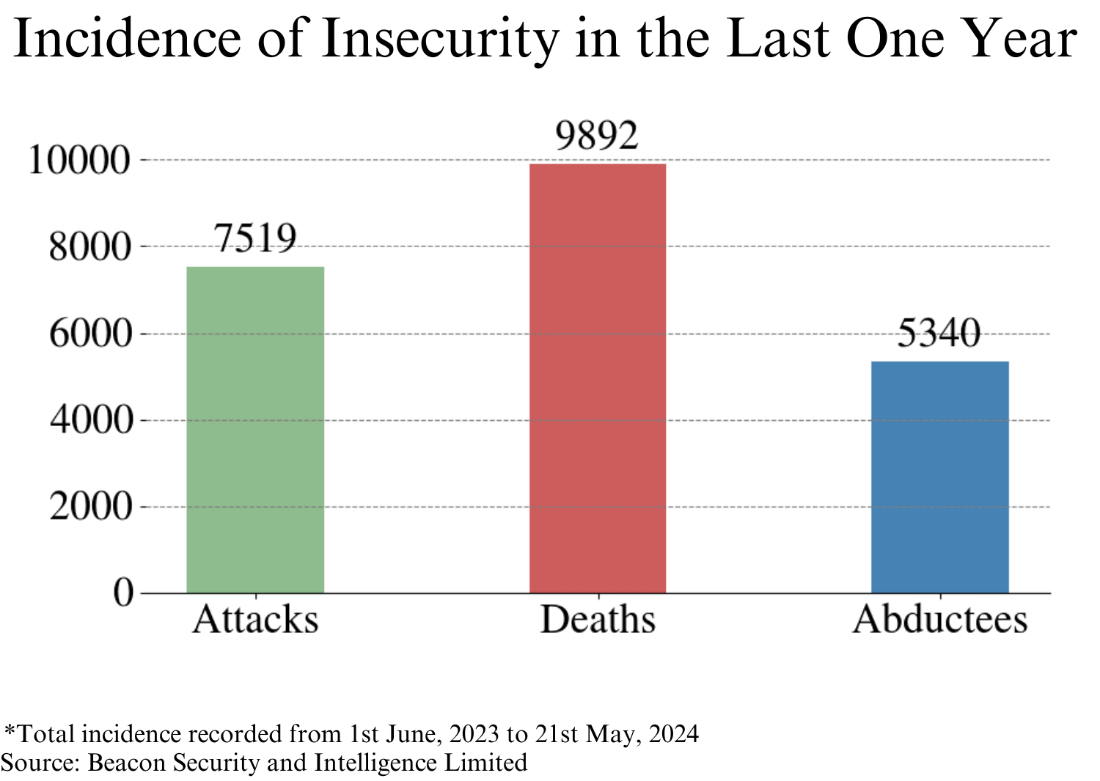
Tinubu’s Security Roadmap and Approach
In ‘The Renewed Hope Agenda’, a manifesto released ahead of the February 2023 presidential election, the Tinubu campaign team described national security as the bedrock of a prosperous and democratic society and acknowledged the protection of the lives and property of citizens as the fundamental responsibility of any government. It pledged to mobilise “the totality of the country’s national security, military and law enforcement assets to protect all Nigerians from danger and from the fear of danger”.
The Tinubu manifesto also promised to “expand and improve upon the use of technology, enhance recruitment of personnel, and bolster existing agencies and systems to achieve this fundamental national security goal”. It promised to “adopt a proactive and intelligence-driven security approach to sufficiently address the nation’s security threats”. Other objectives in the manifesto include implementing community-based security initiatives, promoting socio-economic development, and fostering inter-communal dialogue to address grievances and foster reconciliation. Through these and other policies contained in the manifesto, the Tinubu team aimed to tackle the underlying causes of insecurity by addressing issues such as poverty, unemployment, social marginalisation, and ethnic tensions.
In the Ministerial Briefing Pack, released in June 2023, the Tinubu Administration reiterated its vision, maintaining that national security success will be “determined by the ability to deliver the mandate of Mr. President outlined in the Renewed Hope manifesto”. The pack state the national security vision of the administration as follows: “to ensure the safety, freedom, and prosperity of all Nigerians, upholding a steadfast commitment to their well-being and advancement”.
In addition, the pack listed the following as top priorities: repositioning policing (reform policing to enhance operational effectiveness); protecting territories (ensure safe borders, communities and forest reserves); bolstering security forces (bolster the morale of security forces by improving welfare among others); redefining military practice (remodel the military practice to adapt to modern challenges); and gaining international cooperation (foster collaborative efforts among nations to tackle complex global issues).
On 19th June 2023, the Tinubu Administration announced the appointment of new leadership in some of the agencies and departments in the security sector. The appointments generated mostly positive reactions, with many welcoming it as a first step in the new administration's attempt to meet the objectives of the 7-point agenda on national security set out in the campaign manifesto. Others welcomed the inclusiveness and diversity, especially the federal character reflected in the appointments.
However, not everyone was fully impressed. Those who criticised the appointments narrowed down on the choice of a partisan and non-military person as the NSA, as well as the absence of women. Within the military hierarchy, concerns emerged that the president may still be harbouring anti-military sentiments from his National Democratic Coalition (NADECO) days and that this may have influenced his decision to appoint a non-military person as the NSA. However, a ready counter to this suspicion is that this is not the first time a non-military person would occupy the office: the NSA to late General Sani Abacha was a retired policeman, Ismaila Gwarzo.
On 21st August 2023, Tinubu allocated portfolios to his 48 ministers. He named Badaru Abubakar, the immediate past governor of Jigawa State (2015–2023), as Minister of Defence; Bello Mohammed Matawalle, former governor of Zamfara State from 2019 to 2023, as Minister of State for Defence; Ibrahim Geidam, a former governor of Yobe State and senator as Minister of Police Affairs; Imaan Sulaiman Ibrahim, a former staff of the Federal Capital Territory Administration as the Minister of State for Police Affairs; and Olubunmi Tunji-Ojo, a former federal parliamentarian as Minister of Interior. These ministers, together with the NSA, superintend over the about 29 MDAs in the security sector and help the administration achieve section 14(b) of the Constitution, which states that “the security and welfare of the people shall be the primary purpose of government”.
The assignment of ministerial portfolios in the security sector drew sharp reactions, largely on account of the perceived fit of the new ministers. Some argued that the new ministers lacked academic or professional knowledge of security and defence. Those who belong to this school of thought were also critical of the antecedents of some of the appointees, especially former governors, some of whom had corruption allegations. They considered this as not confidence-inspiring.
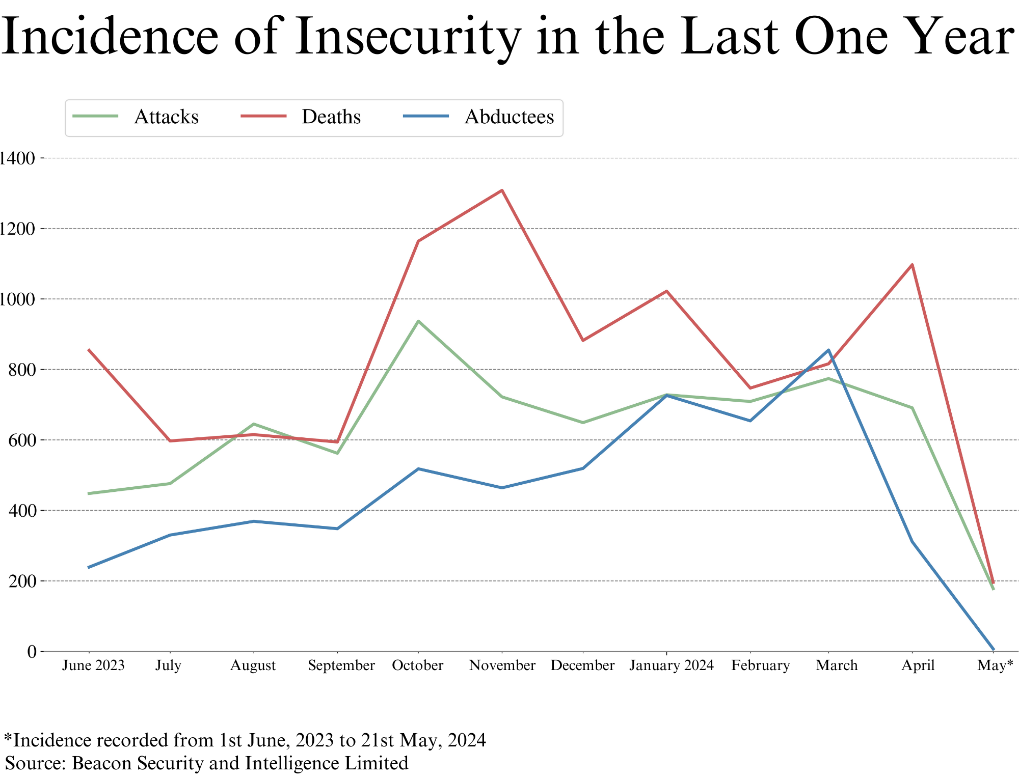
Assessment of Key Security Initiatives under Tinubu
In pursuit of various pledges on the security front, the Tinubu Administration has rolled out a number of initiatives. We will briefly assess the rationale, scope and impact of 11 of such.
- Counter Terrorism
The terrorism challenge remains high in Nigeria as indicated in the Global Terrorism Index ranking of Nigeria as the eighth most terrorised country in the world in 2023. The terrorism challenge in Nigeria now includes cells beyond the traditional North-East and Lake Chad region to new frontiers in parts of North-Central and North-West and new players beyond the ideological terrorist groups popularly called Boko Haram to include gunmen, locally referred to as bandits. In its one year in office, the Tinubu Administration has not made a major policy declaration on counter-terrorism but has been active in the implementation of existing measures and fostering regional and international cooperation. In April 2024, the administration partnered with the United Nations Office of Counter-Terrorism (UNOCT) to host a high-level African counter-terrorism summit under the theme, 'Strengthening Regional Cooperation and Institution Building to Address the Evolving Threat of Terrorism'.
Security Trends in Nigeria
At the 78th United Nations General Assembly (UNGA 78), President Tinubu, on 20th September 2023, reiterated his commitment to ridding the continent of violent extremism. He called on the global community to partner with Africa in addressing the challenges of governance, human trafficking, and violent extremism, which he said has given rise to inhuman commerce, the infiltration of mercenaries and extremists armed with lethal weapons and vile ideologies, victimising both adults and children, and undermining regional peace and stability. President Tinubu urged the international community to increase its commitment to curbing the flow of arms and militants into West Africa.
The United Nations is collaborating with the Tinubu Administration to build the capacity of Nigeria’s security forces to prevent, detect, investigate, and prosecute terrorist offences in fulfilment of the National Counter Terrorism Strategy. A comparison of the UN Global Counter-Terrorism Strategy and Nigeria’s National Counter-Terrorism Strategy (NACTEST) shows that both strategies are built on four pillars, namely: prevention, combating, capacity building, and human rights. This indicates a robust provision for preventative and offensive counter-terrorism approaches in both strategies.
Nigeria's implementation of its counter-terrorism strategy, before and under the Tinubu Administration, is skewed towards the offensive (combative) approach involving kinetic operations, which entail intelligence gathering and using force to engage non-state actors and groups (NSAGs). This is despite the tremendous progress made by Nigeria in creating platforms for Countering Violent Extremism (CVE) and monitoring of terrorism funding.
One major area where the administration appears to have succeeded is in reducing the influence of the secessionist agitators such as the Indigenous Peoples of Biafra (IPOB) and its various affiliations in the South-East, especially their ability to enforce the periodic sit-at-home orders and to attack targeted locations and individuals. However, it is generally believed that this may be temporary unless the administration concludes on the prolonged incarceration of the IPOB leader, Nnamdi Kanu. - Deployment of Non-Kinetic Measures to Address Insecurity
The Tinubu Administration is pursuing several non-kinetic measures (strategies and approaches) to solve the security challenges. These include the strengthening of the administration of criminal justice and the reopening of trials of terrorism suspects and prosecutions ongoing in eight different courts. Concurrently, the administration is working on reducing the proliferation of arms nationwide by blocking the flows of arms and arresting gunrunners. There is a new leadership at the National Centre on Small Arms and Light Weapons (NCSALW). The administration is, however, yet to solve the challenge of an existing parallel commission on small arms and light weapons. Otunba Adejare Adegbenro, acting DG of NATCOM, admitted on national television that his organisation’s mandate was yet to receive presidential assent and that it was operating with the bill passed by the National Assembly.
There are indications too that the Tinubu Administration is focusing on counterinsurgency strategies aimed at winning the hearts and minds of local populations to isolate insurgents from their support base and prevent the recruitment of new members. The administration’s strategies involve engaging with communities, providing humanitarian assistance, promoting reconciliation and deradicalisation programmes, implementation of peace-building programmes, and promotion of dialogue and reconciliation fora. Additionally, educational campaigns designed to counter violent extremism are increasingly being recognised as pivotal components of the broader strategy to restore peace. Other non-kinetic strategies by the administration include infrastructure development, job creation programmes, improved education and healthcare services. Efforts to tackle poverty and inequality are also critical parts of this approach. These initiatives collectively represent a multidimensional approach aimed at addressing the underlying causes of conflict and building a foundation for long-term stability.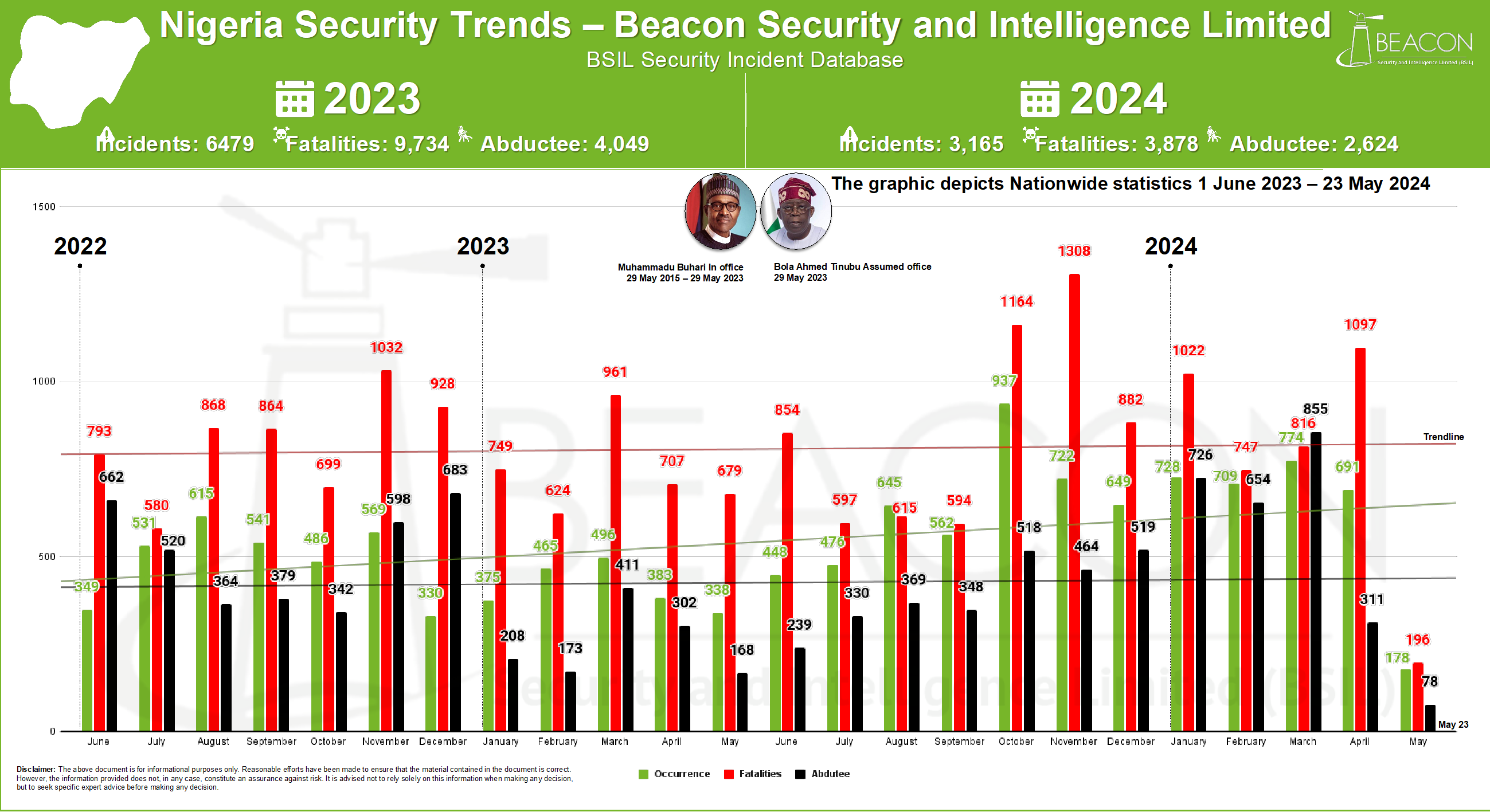
Security Trends June 01, 2022 – May 21, 2024
The administration’s emphasis on non-kinetic efforts alongside kinetic strategies marks a significant recognition that achieving peace in conflict zones extends beyond military might. It includes sustained and cooperative engagement across various sectors. In this regard, several MDAs as well as the armed forces have been implementing non-kinetic measures, including public engagement sessions. Similarly, ONSA, in March 2024, held a meeting which had in attendance 15 northern governors as well as service and intelligence chiefs (note that the absentee governors included that of Katsina and Zamfara, both frontline states). The agenda of the meeting was dedicated to formulating strategies to tackle the pressing security challenges in Northern Nigeria. A significant outcome of the discussions was the consensus on the necessity of transcending mere territorial dominance to also focus on winning the hearts and minds of the populace, thereby fostering a holistic approach to reinstating peace and stability in the region. - The Pulaku Initiative for Addressing Banditry and Other Armed Conflicts
The prevalence of armed violence in Nigeria’s northern geopolitical zones has long evolved around the resource-based conflict between nomadic Fulani herdsmen and sedentary farmers to armed banditry with terrorist-prone doctrines, and quasi-armed militia violence. With civilians being largely impacted by these attacks, the bloody trail of banditry-related violence left over 2,985 dead and 2,281 abducted between January 1, 2021, and September 30, 2023, according to Beacon Consulting Security Incident Data. The spate of attacks over time has also led to ongoing military offensive operations, which have, to a greater extent, inhibited the ability of non-state armed groups to operate. However, the absence of critical initiative to address the factors contributing to the violence has left the situation unresolved.
The Tinubu Administration approved N50 billion to the National Emergency Management Agency, NEMA, to kick-start the Pulaku Initiative, aimed at providing a non-kinetic solution to address the root causes of all the banditry and insurgency, with consent for the construction of 1,000 houses in Sokoto, Kebbi, Katsina, Zamfara, Kaduna, Niger, and Benue states. The houses will have the ancillary facilities of schools, clinics, and veterinary clinics, while ranches have so far been set up for the Fulani communities in Kaduna and Benue states.
The initiative stands as a revamped approach to addressing the unending herder-farmer conflict, with support for the disadvantaged communities and, most of all, a government presence, which is key to asserting control in areas deemed ungoverned and largely exploited by armed groups. - Food Security
In July 2023, the Tinubu Administration, in response to the rising inflation in the country, announced a comprehensive intervention plan on water and food security and affordability, which it included within the purview of the National Security Council. One of the key elements of the intervention plan was to increase security for farms and farmers. The administration mooted the need to enhance efforts towards achieving anti-corruption, inclusivity, and climate change mitigation through a comprehensive climate security strategy.
On 15th February 2024, Tinubu and Vice-President Kashim Shettima met with the 36 state governors and the FCT minister at the State House in Abuja where they agreed on a common ground to address some of the challenges facing the country, especially the rising cost of food and insecurity. They took several decisions, including an increase in police recruitment, working with the National Assembly to put in place a mechanism that will create state police instead of the vigilantes that are being used in some states and strengthening forest rangers in the states. They also agreed to collaborate to increase local food production. Nonetheless, data released by the National Bureau of Statistics showed that food inflation was at 40.53% in April 2024. There is a clear link between the government’s economic policies (especially petrol subsidy removal and devaluation of the Naira) which have pushed up food inflation, and which in turn have implications for food security and national security. - Reforming the Police
Reforming the police is a key component of the Renewed Hope Agenda, the campaign promise of President Tinubu. However, one year into the administration, not much traction has been recorded. The Ministers of Police Affairs, the Chairman of the Police Service Commission, and the Inspector-General of Police have made commitments to police reform including the setting up of a committee to resolve a dispute that hampered recruitment into the police force. They have also stated the need for a consequential modification of the allied policy and operational instruments that guide the functioning of the Nigeria Police Force, such as the Police Regulations following the introduction of Police Act of 2020, the first comprehensive reform of the police legislation since the Police Act of 1943.
Reforming the police will significantly address Nigeria's policing deficit and enhance internal security. Despite the Nigerian police boasting a staff strength of approximately 371,800 police officers, the reality is starkly different. Over 100,000 officers are dedicated to special protection duties for VIPs and politicians. This leaves the Nigeria Police Force with only 270,000 officers and men, who together with other organisations involved in policing such as Nigeria Security and Civil Defence Corps (NSCDC), the Federal Road Safety Corps (FRSC) amongst others, to cater to the policing needs of over 200 million Nigerians. This imbalance underscores not only the underutilisation of our police force but also the prioritisation of a few at the expense of the majority. The Ministry of Police Affairs must go beyond mere announcements. The leadership must embrace the performance measurement and consequence management policies by the government and swiftly follow up with a well-defined policy framework and a structured monitoring and evaluation platform. This will instil confidence in the public, assuring Nigerians that these pronouncements mark a decisive departure from past practices. - The State Police Debate
The 15th February 2024 meeting between Tinubu and the state governors, mentioned above, precipitated a national discourse on the pros and cons of the decentralisation of policing in Nigeria. On 20th February 2024, a bill proposing the establishment of state police passed its second reading in the House of Representatives following extensive deliberation. The bill aims to amend the 1999 Constitution by relocating policing powers from the exclusive legislative list to the concurrent legislative list, granting states authority on policing within their jurisdictions. It introduces 16 constitutional alterations and outlines a framework to ensure coherence, accountability, and standardisation between federal and state police forces, including establishing state police service commissions. The bill was sponsored by the Deputy Speaker, Hon. Benjamin Kalu, and 14 others. The bill received enormous bipartisan support, an indication of the collective interest in decentralising policing and engendering community involvement in internal security. The bill will be passed on to the Constitution Review Committee for further legislative action.
There is no consensus among Nigerians on the issue of state police. Those who are in support of state police argue that a decentralised policing structure allows for a more granular approach to identifying and solving security challenges, enabling a more responsive and practical approach. The proponents point to the perceived shortcomings of the current centralised policing system, citing its ineffectiveness, thin spread and deployment, particularly in rural areas, and general policing inadequacies that have engendered varied security challenges, including terrorism, banditry, inter-community violence, and violent and opportunistic crimes. However, those opposed to the decentralisation of policing cite the poor financial status of the states and their inability to pay their workforce, the poor observance of democratic tenets at the subnational levels where the executive arm is dominant over the other two arms, and the potential for misuse, particularly in states with a history of ethnic or political tensions. These critics cite state-sanctioned violence and the erosion of national cohesion as credible concerns.
Irrespective of the positions of the different camps on the state police debate, the most critical requirement is for Nigeria to start by defining its policing imperatives and to resolve that the current structure, which has different ministries, departments, and agencies performing policing functions in an uncoordinated manner, impedes the aspiration for enhanced internal security. Adopting this approach will mark a significant departure from past practices within the police force and signal a paradigm shift towards enhancing internal security. Such changes will prioritise public safety and inclusiveness, creating a policing framework that caters to the needs of all Nigerians and fosters a safer environment nationwide.
Also, the IGP will need to complete the police reform embarked upon by the President Muhammadu Buhari Administration, and its implementation roadmap for embedding accountability and professionalism, promoting community policing, investing in training and capacity building, upgrading equipment and technology, improving welfare and compensation, initiating legal and legislative reforms, and fostering collaboration and partnerships. It is also imperative that the IGP’s ability to achieve the objectives of the reform agenda and the ongoing efforts to transform the NPF into a more professional, accountable, and community-oriented institution that effectively addresses security challenges and upholds the rule of law will go a long way toward contributing to Tinubu’s administration desire to win the hearts and minds of the people as a prerequisite for improved national security. - Oil Theft
Nigeria’s budgets are heavily dependent on proceeds from revenue from the oil and gas sector. Thus, oil theft has had far-reaching impact on the national economy. It has persisted despite the presence of counter-theft operations of the security agencies
The Tinubu Administration has placed combatting oil theft as a key deliverable for the security sector organisations. The National Economic Council (NEC), chaired by Vice President Kashim Shettima, in December 2023 reconstituted an existing committee, the Crude Oil Theft and Management Committee, with Governor Hope Uzodimma of Imo State as its chairperson. The committee’s report was submitted in April 2024.
Using OPEC reports on Nigeria’s oil production and export, it can be inferred that the administration recorded some success in this area in Q3 2023 but these were reversed in Q1 2024. According to OPEC’s Monthly Oil Market Report (MOMR) for February 2024, throughout Q3 2023, oil exports from Nigeria witnessed a remarkable 60.8% increase, culminating in a trade surplus of N1.89 trillion in that period,”. It also revealed that exports rose by 115%, y-o-y, reaching an unprecedented high of N3.87 trillion. According to the report, “Nigeria boasted a significant trade surplus of N1.44 trillion, a strong rebound from the N7.2 billion deficit recorded in September 2022.”
In the OPEC’s MOMR for March 2024, Nigeria’s output slid to 1.322 million barrels per day (mbpd) in February 2024, from 1.427mb/d in January 2024, representing a loss of 104, 000 barrels per day. Nigeria was among several countries allocated a lower crude oil output target after years of failing to meet the previous quotas. Nigeria’s 2024 quota was reduced to 1.53mbpd from the previous year’s 1.74mbpd.
In the April 2024, Nigeria’s output slid further to 1.23mbpd from the 1.32mbpd of March. The April output figure represented the lowest production rate the country has recorded since July 2023. This is in comparison to Libya which recorded 1.24mbpd of crude production in March, a 5.9% increase from 1.17mbpd in February. The drop of 90,000 barrels per day, according to direct communications from OPEC underscores the difficulties the Nigerian oil sector faces, such as limited infrastructure, security breaches in oil-producing areas, and operational hiccups. - Increasing Local Sourcing of Defence and Security Equipment
On 23rd November 2023, Tinubu assented to the Defence Industries Corporation of Nigeria (DICON) Bill, 2023, which repeals the previous iteration of the Act and empowers the corporation to operate, maintain, and control subsidiaries and ordnance factories. The bill establishes the Defence Industry Technology, Research, and Development Institute (DITRDI) to create a scientific and research-based technological foundation for Nigeria's defence industry. It also provides a comprehensive regulatory framework for the manufacturing, distribution, storage, and disposal of defence articles in Nigeria. The law also encourages the development of a nuanced financing architecture that enables private capital to facilitate research, development, and production in the defence sector in a transparent and predictable manner.
So far, the administration has signed several defence agreements including the finalisation of a $1 billion agreement with India, $36.5 million contract with Turkish defence companies to supply equipment for border and internal security systems, including UAVs, offshore patrol vessels, surveillance cameras, and related technology and with the UAE to bring DICON to 40% self-sufficiency in local manufacturing and production of defence equipment in-country by 2027. - Non-Payment of Ransom for Victims of Kidnapping
In compliance with provisions of the Terrorism (Prevention and Prohibition) Act 2022, the Tinubu Administration declared that it would not pay ransom to free kidnapped persons. Despite this stance and claim by the administration that it rescued over 1000 victims including about 137 students abducted in Kuriga, Chikun LGA in March 2024, kidnapping for ransom remains an active threat across most parts of Nigeria. As shown in the map below on mass abductions that occurred from 1st January – 31st March 2024, fourteen cases of kidnapping with over 800 victims were recorded across several parts of Nigeria. - Cybersecurity
Cybercrime is a high-level threat in Nigeria. Despite the prevalence of cybercrimes, the Renewed Hope Agenda had no major entry on cybersecurity. However, in March 2024 the administration steered effort that led to the Cybercrimes (Prohibition, Prevention, etc) Amendment Act 2024 and in May 2024 directed its full implementation. The new law is expected to galvanise effort towards addressing existing vulnerabilities in cybersecurity that continue to affect individuals and businesses as well as public organisations in Nigeria. In March 2024, one of such vulnerabilities caused a major disruption of internet services in the country following an undersea fibreoptic cable cut. Additionally, hacking and cyber fraud remain active threats in Nigeria with attendant consequences resulting in the loss of billions of Naira.
The National Cybersecurity Strategy and Policy envisages the establishment of a cybersecurity commission, but this is yet to be done. As such, there is no specific regulatory authority for the enforcement of the provisions of the Cybercrimes Act in Nigeria. Rather, it is the obligation of all security agencies in Nigeria to enforce the provisions of the Cybercrimes Act. However, the ONSA is responsible for coordinating the implementation of the Cybercrimes Act by the security agencies. - Coordination of the Intelligence Community
The core of Nigeria’s intelligence functions is carried out by the Office of the National Security Adviser (ONSA), which coordinates the activities of the State Security Service (SSS), the Defence Intelligence Agency (DIA) and the National Intelligence Agency (NIA). On 19th June 2023, Tinubu appointed Nuhu Ribadu as the National Security Adviser (NSA) and Major General Emmanuel Undiandeye as the Chief of Defence Intelligence (CDI). The leaderships of both the NIA and SSS are unchanged.
Under the administration, Nigeria is working on prioritising intelligence gathering and sharing as a crucial component of its kinetic efforts towards addressing insecurity at home and in the West African sub-region. This is hinged on the administration’s belief that enhanced intelligence capabilities, including surveillance, reconnaissance, and information gathering enable security forces to identify and mitigate threats more effectively. These efforts have had a mixed result. For example, security forces have killed high-profile bandit leaders such as Ali Kawaje and Boderis. They have also successfully disrupted existing cells of terrorists, securing the region further, and diminishing threats to public safety. However, several mass abductions (see below) occurred suggesting that there was no intelligence to forestall their occurrence or the intelligence not acted upon. In addition, the Niger Coup in July 2023 and how it was handled indicate a failure of intelligence.
Under the Tinubu Administration, ONSA unsuccessfully attempted to have the Senate review the National Security Act to allow it the power to recruit its staff and some level of operational authority. This failed attempt and the decision of ONSA to bring into the intelligence community non-intelligence professionals and give them top management positions at ONSA created a circumstance of grievance and uncertainty among the staff of the office with the potential for internal sabotage and the existence of fifth columnists. Observers view that at the moment the leadership of ONSA suffers from a trust challenge coupled with a possible burnout syndrome as well as the non-possession of technical skills for intelligence management. These are seen as impacting negatively on the office’s performance in its coordinating functions. These observers also view that the increasing desire for the ONSA to take on operational role means that its coordinating roles will continue to suffer.
Overall, under the Tinubu Administration, the quality of intelligence has not improved in most instances and a considerable inverse reduction is being observed given security occurrences such as the mass abduction and the killing of security forces across several states in the country. There is also a legitimate concern that the quest for an operation mandate by ONSA once granted could be used to achieve political objectives given the incumbent NSA’s partisan antecedents.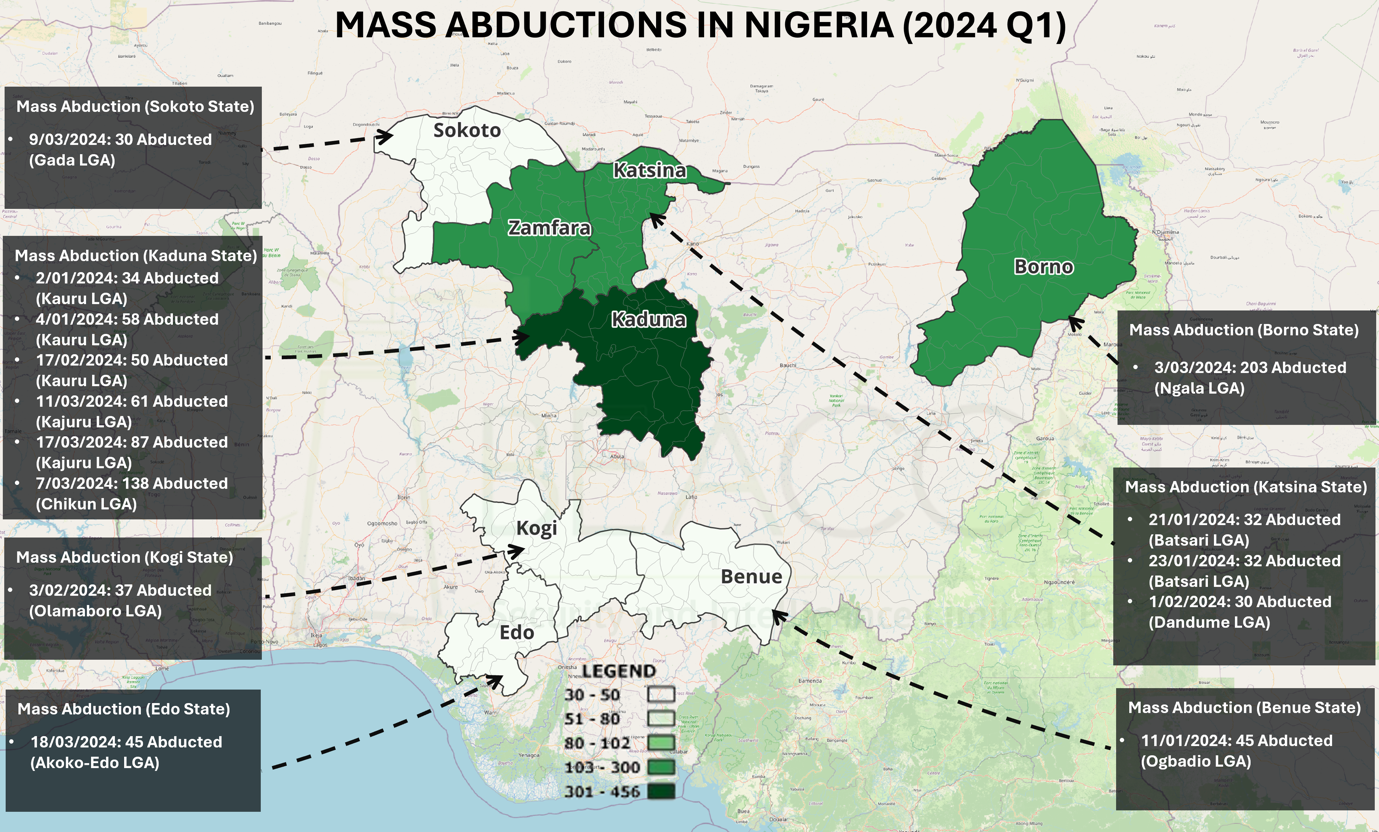
Map of Mass Casualties in Nigeria (January 01 – March 31, 2024)
Source: Beacon Security and Intelligence Limited
Conclusion and Recommendations
The Tinubu Administration has demonstrated an unwavering commitment to solving the security challenge affecting Nigeria and had put forward in the Renewed Hope Agenda a multitude of strategies and measures to do so. However, like the administration of Buhari, the Tinubu government is not showing strong credentials in security sector governance and in security sector reform necessary to bridge the gap that exists and that is hindering accountability, coordination, collaboration and cooperation—all of which are vital ingredients that will allow an all-of-government and all-of-society approach to solving the insecurity challenge.
This is why despite the administration’s commitment and the significant efforts by officials appointed to head security sector ministries, departments and agencies, insecurity remains a challenge in Nigeria. To correct this and reverse the trend of spiralling threats to public safety and security, the administration should ensure improved accountability and security sector governance including compliance with existing national security structures and the regular meeting of the defence, security, police and other security and intelligence related councils and committees. Additionally, the administration should strengthen financial and operational accountability and consequence management in the security sector. This will help steer efforts towards achieving the all-of-government and all-of-society approach in managing national security.
In the area of counter-terrorism, there is a need for the security sector to increase its knowledge of measures for preventing the root causes of terrorism and effectively combatting criminal threats by building its capacity while ensuring the respect for human rights for all and the rule of law as the fundamental basis of the fight against terrorism. The administration’s effort to foster regional and international cooperation indicates a recognition of the complex threats posed by terrorism and a collective commitment to addressing the evolving nature of terrorism comprehensively by utilising both offensive and constructive approaches, which are encompassed in the UN and Nigeria’s counter-terrorism strategy, to effectively and efficiently dissuade the perpetrators of these activities in Nigeria.
It is equally important for the administration to address the following constraints to optimal performance:
- The failure to convene and hold regular security and defence council meetings. Since the swearing of the president on 29th May 2023, it is on record that only one National Security Council meeting has been held despite several critical security occurrences that have been recorded. Instead, the president continues to meet security sector leadership on an ad-hoc basis. While ad-hoc meetings have their place, it is recommended that they should not replace the constitutional platforms provided for discussion and agreeing measures for addressing critical national security issues. The administrative and other support platforms associated with the councils ensure implementation of decisions better that the ad-hoc meetings.
- Lack of trust, ineffective coordination, cooperation, and poor collaboration among security agencies are the major reasons for the ineffectiveness of the security infrastructure in the country. Situating internal security departments and agencies in at least three ministries (Interior, Police Affairs and Finance) and the increasing assumption of operational powers by the Office of the National Security Adviser is an impediment to achieving the desired results and the imperatives of the Renewed Hope Agenda. As an example, several MDAs are currently acquiring drones and other Unmanned Aerial Vehicles (UAVs) with no proper coordination and harnessing of the potentials of these assets. Other examples are the creation and supervision of a tactical unit by ONSA and the domestication of the National Centre for the Control of Small Arms and Light Weapons in ONSA.
- Weak and uncoordinated security framework for intelligence gathering, fusion and sharing among security agencies. In spite of several presidential directives on intelligence fusion and budgetary provision for technical acquisitions to allow active surveillance, structural and institutional challenges have prevented these from being done. Additionally, given the increasing involvement of technology and the risks associated with cybersecurity, there is a need for a more robust operationalisation of the National Cybersecurity Policy and Strategy of 2021.
- Little buy-in from citizens and state governors. Most of the administration’s policies on security have received very little buy-in from citizens and state governors. This is the function of a challenge in the policy-formulation process and the inability of the administration to implement comprehensive strategic communication.
- Lack of functional integrated system of monitoring and evaluation. There is lack of an integrated system within the ministries and their departments and agencies which prevent the collection and storing of data to show realistic targets and achievements.
- Little accountability and no consequence management in the security sector. In the one year of the Tinubu Administration, several security lapses have occurred with attendant consequences on lives and property across several parts of Nigeria but no consequences have been meted out on security sector practitioners whose inaction or negligence or even sabotage led to these acts. An example is the mass abduction of students in Kuriga, Chikun LGA, Kaduna State in March 2024.
- Increasing socioeconomic challenges including growing poverty. Some policies of the administration have the unintended consequences of resulting in widespread hunger, anger and disenchantment, further contributing to the root causes of insecurity.
In addition to addressing the constraints to performance listed above, it is important for the administration to take the following measures:
- Disaggregate security challenges and deploy appropriate strategies: There is an urgent need for the coordinating elements in the security sector—the Office of the National Security Adviser, the ministries of defence, interior and police affairs—to disaggregate the different security challenges affecting Nigeria to allow for the development of specific and appropriate frameworks for addressing each of them. As an example, currently kinetic force is being used to fight identity-based conflict when what is needed more are non-kinetic measures.
- Emplace Robust Monitoring and Evaluation Measures: it is important that regular security and defence council meetings are held and that the proceedings are gazetted and implemented as relevant. This will ensure enhanced coordination and allow a global view of progress or lack of it. In doing this, we advocate the adoption of metrics and monitoring and evaluation measures.
- Strengthen Coordination Mechanisms: it is critical to ensure that the coordinating elements within the national security sector (Office of the National Security Adviser, ministries of defence, interior, police affairs and to an extent the Ministry of Justice, the Secretary to the Government of the Federation and the Presidency) strengthen mechanisms for increasing the effectiveness and efficiency of inter-ministerial collaboration and coordination that contribute to achieving improved national security. This requires a strategic review of the roles of the coordinating elements within the sector as well as that of the Federal Ministry of Justice to ensure unity of purpose and to identify the structural, institutional, and operational challenges that have prevented this in the past.
- Streamline Non-Kinetic Interventions: The implementation of non-kinetic measures by MDAs at the moment is haphazard and lacks coordination. It appears that some MDAs conceive non-kinetic measures as a substitute for the non-performance of governance structures at the subnational levels. This is not sustainable. A more pragmatic approach is for the coordinating elements in the security sector to engage with the national and sub-nationals (as well as state assembles) to impress on them the need to support the implantation of the non-kinetic measures.
- Mainstream Climate Change Adaptation Measures: This will be necessary as one of the measures for addressing root causes of insecurity.
- Embrace Consequence Management: There is urgent need to demonstrate accountability, especially where performance does not meet public expectation or lapses lead to significant security gaps and to show a positive correlation between performance and output including reform imperatives. Accountability should include implementing punitive measures in a demonstrable manner. This will help achieve the desire to win the hearts and minds of the people.
- Improve Data Collection: Data collection and collation continue to be a challenge. It is constraining planning and performance tracking for the parastatals and the security sector ministries.
- Strengthen Intelligence Framework: Weak security framework for intelligence gathering and sharing among security agencies remains a challenge and needs to be addressed urgently.
- Enhance Strategic Communication: Regular and strategic communication will be critical to overcoming the various security challenges confronting the country. It will be thus be important for the coordinating elements to release policy guidance on strategic communication and to ensure the immediate resuscitation of the bi-monthly Inter-Ministerial Coordination Meeting between the ministries of defence, interior, police affairs, Niger Delta Affairs, and Information & Culture respectively to promote synergy, coordination, and dissemination of information.
- Promote Inclusive and Meaningful Dialogue: Promoting genuine dialogue that involves all stakeholders, including marginalised communities, to foster a holistic and durable peace will be critical. This entails creating spaces for meaningful participation and representation of diverse voices in decision-making processes.
- Prioritising Prevention and Resilience: This can help mitigate the risk of future insecurity especially in affected communities. The measures to be taken should include strengthening early-warning systems or creating such where they don’t exist, ensuring full implementation of the community policing initiatives, and programmes to address the root causes of conflict and violence and encouraging the deployment of transitional justice to bridge the gaps created by the failures of the normal justice system.
- Strengthening Relations with Nigeria’s Neighbours: Given the cross-boundary and regional dimensions of insecurity, maintaining good relations with our neighbours will remain a critical success factor for securing and stabilising not only our country but our region.
Dr. Kabir Adamu, an enterprise security risk and intelligence consultant, is the Managing Director of Beacon Consulting and Intelligence Limited.
Cover Picture: Getty Images

